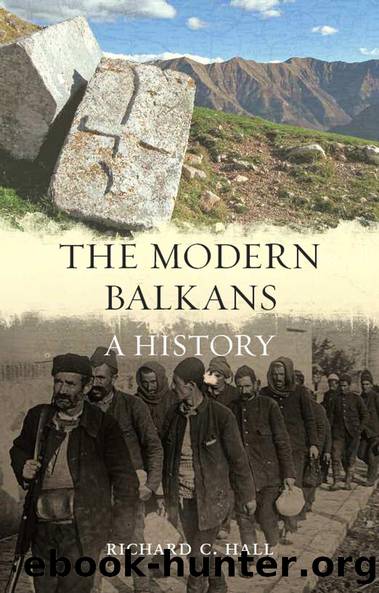The Modern Balkans by Richard C. Hall

Author:Richard C. Hall [Hall, Richard C.]
Language: eng
Format: epub
Tags: History, General, Europe, Eastern
ISBN: 9781780230061
Google: fi-ghCGiFdYC
Publisher: Reaktion Books
Published: 2012-01-01T01:06:31+00:00
six
Renewed War, 1939â45
Unlike the war of 1914, the European war of 1939 did not originate in the Balkans. Nevertheless, the machinations of the Italians and the Germans throughout Europe were not lost on the Balkan states, nor were overt German preparations for war. By 1939 the economies of the Balkan states were subordinate to that of Nazi Germany. The Balkan Entente was fragile. There existed little prospect of any united Balkan effort to resist Germany. For some in Greece and Yugoslavia, the Germans were preferable to the Italians, simply because the Germans were more remote geographically and did not press claims on national territories. The economic ties to Germany were strong, the fears of Soviet Russia were fierce and the Western powers were remote.
Nevertheless the first fighting of the Second World War in Europe did start in the Balkans. This occurred during the Italian invasion of Albania in April 1939. To a considerable degree this invasion was unnecessary. Albania was already under Italian control. King Zog acknowledged this in a message he sent to Italy in 1938: âAlbania is now in Italyâs hands, for Italy controls every sector of the national activity. The King is devoted. The people are grateful. Why do you want anything more?â1 Zogâs marriage that year to Géraldine Apponyi (1915â2002), a half-American Hungarian countess, apparently had disquieted Rome. The Albanian king could now perpetuate a dynasty. Also, Mussolini was eager to replicate the success Germany had had the previous month in dismembering rump Czechoslovakia: disregarding the Munich Agreement of the previous year, Hitler had annexed Bohemia and Moravia and turned Slovakia into a German satellite state.
On 25 March 1939, the Italians demanded the establishment of a formal protectorate over Albania. King Zog stalled for time, but no help was forthcoming from any quarter. The British and French were far more concerned about the fate of Czechoslovakia. In the absence of a response, the Italians launched an invasion on 7 April. In spite of their pervasive influence in the country, they did encounter some resistance, especially at Durrës. They overcame this quickly, and soon occupied most of the country. Zog, Geraldine and their two-day-old son Prince Leka (1939â) fled the country, going first to Greece and after some travails finally settling in Great Britain. After the Italians occupied the country, an Albanian legislature continued to function with Italian advisors. King Victor Emanuel III added the title of King of the Albanians to those of King of Italy and Emperor of Ethiopia. The Italians also presented themselves as the champions of Albanian unity. Some Albanians collaborated with the Italian regime and a small Albanian Fascist Party emerged. Economic development increased. Even so, the Italian presence was largely limited to coastal and lowland regions.
The increased Italian presence on the Balkan mainland alarmed the governments in Athens and Belgrade. Concern about the possibly Italian attack from new bases in Albania led General Metaxas to accept the British offer of a guarantee against aggression in April. At the same time, King Carolâs Romania also accepted a British offer of support.
Download
This site does not store any files on its server. We only index and link to content provided by other sites. Please contact the content providers to delete copyright contents if any and email us, we'll remove relevant links or contents immediately.
| Buddhism | Christianity |
| Ethnic & Tribal | General |
| Hinduism | Islam |
| Judaism | New Age, Mythology & Occult |
| Religion, Politics & State |
Cecilia; Or, Memoirs of an Heiress — Volume 1 by Fanny Burney(31341)
Cecilia; Or, Memoirs of an Heiress — Volume 3 by Fanny Burney(30938)
Cecilia; Or, Memoirs of an Heiress — Volume 2 by Fanny Burney(30896)
The Secret History by Donna Tartt(16643)
Sapiens: A Brief History of Humankind by Yuval Noah Harari(13067)
Leonardo da Vinci by Walter Isaacson(11912)
The Radium Girls by Kate Moore(10914)
Sapiens by Yuval Noah Harari(4546)
The Wind in My Hair by Masih Alinejad(4427)
How Democracies Die by Steven Levitsky & Daniel Ziblatt(4407)
Homo Deus: A Brief History of Tomorrow by Yuval Noah Harari(4287)
Endurance: Shackleton's Incredible Voyage by Alfred Lansing(3852)
The Silk Roads by Peter Frankopan(3769)
Man's Search for Meaning by Viktor Frankl(3644)
Millionaire: The Philanderer, Gambler, and Duelist Who Invented Modern Finance by Janet Gleeson(3574)
The Rape of Nanking by Iris Chang(3522)
Hitler in Los Angeles by Steven J. Ross(3443)
The Motorcycle Diaries by Ernesto Che Guevara(3340)
Joan of Arc by Mary Gordon(3262)
